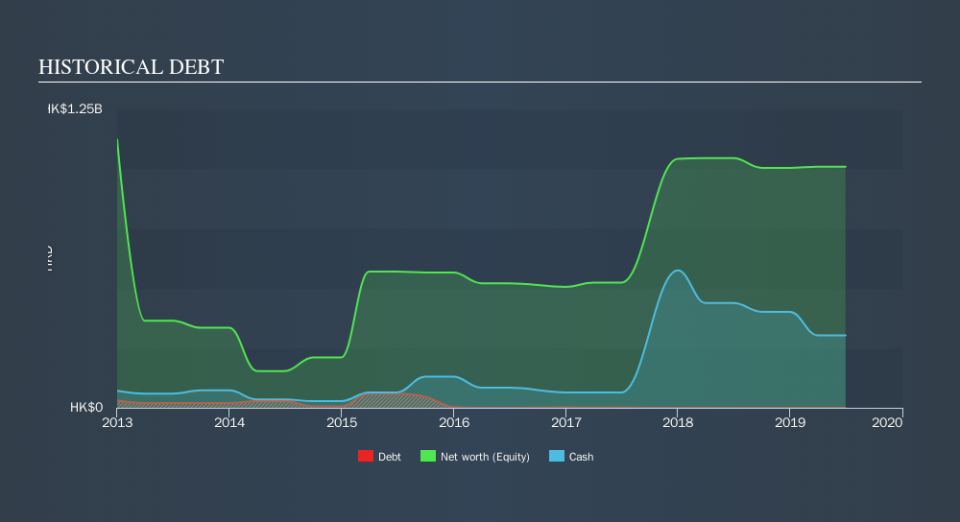Is Kaisa Health Group Holdings (HKG:876) Weighed On By Its Debt Load?

Some say volatility, rather than debt, is the best way to think about risk as an investor, but Warren Buffett famously said that 'Volatility is far from synonymous with risk. So it seems the smart money knows that debt - which is usually involved in bankruptcies - is a very important factor, when you assess how risky a company is. We can see that Kaisa Health Group Holdings Limited (HKG:876) does use debt in its business. But is this debt a concern to shareholders?
What Risk Does Debt Bring?
Debt is a tool to help businesses grow, but if a business is incapable of paying off its lenders, then it exists at their mercy. Ultimately, if the company can't fulfill its legal obligations to repay debt, shareholders could walk away with nothing. While that is not too common, we often do see indebted companies permanently diluting shareholders because lenders force them to raise capital at a distressed price. By replacing dilution, though, debt can be an extremely good tool for businesses that need capital to invest in growth at high rates of return. When we think about a company's use of debt, we first look at cash and debt together.
See our latest analysis for Kaisa Health Group Holdings
What Is Kaisa Health Group Holdings's Net Debt?
You can click the graphic below for the historical numbers, but it shows that as of June 2019 Kaisa Health Group Holdings had HK$273.0k of debt, an increase on none, over one year. However, its balance sheet shows it holds HK$303.8m in cash, so it actually has HK$303.5m net cash.
How Healthy Is Kaisa Health Group Holdings's Balance Sheet?
The latest balance sheet data shows that Kaisa Health Group Holdings had liabilities of HK$52.3m due within a year, and liabilities of HK$13.5m falling due after that. Offsetting this, it had HK$303.8m in cash and HK$113.3m in receivables that were due within 12 months. So it can boast HK$351.3m more liquid assets than total liabilities.
This luscious liquidity implies that Kaisa Health Group Holdings's balance sheet is sturdy like a giant sequoia tree. On this basis we think its balance sheet is strong like a sleek panther or even a proud lion. Succinctly put, Kaisa Health Group Holdings boasts net cash, so it's fair to say it does not have a heavy debt load! There's no doubt that we learn most about debt from the balance sheet. But it is Kaisa Health Group Holdings's earnings that will influence how the balance sheet holds up in the future. So if you're keen to discover more about its earnings, it might be worth checking out this graph of its long term earnings trend.
In the last year Kaisa Health Group Holdings had negative earnings before interest and tax, and actually shrunk its revenue by 7.3%, to HK$234m. That's not what we would hope to see.
So How Risky Is Kaisa Health Group Holdings?
Statistically speaking companies that lose money are riskier than those that make money. And the fact is that over the last twelve months Kaisa Health Group Holdings lost money at the earnings before interest and tax (EBIT) line. And over the same period it saw negative free cash outflow of HK$139m and booked a HK$18m accounting loss. But at least it has HK$303.5m on the balance sheet to spend on growth, near-term. Overall, its balance sheet doesn't seem overly risky, at the moment, but we're always cautious until we see the positive free cash flow. For riskier companies like Kaisa Health Group Holdings I always like to keep an eye on whether insiders are buying or selling. So click here if you want to find out for yourself.
At the end of the day, it's often better to focus on companies that are free from net debt. You can access our special list of such companies (all with a track record of profit growth). It's free.
We aim to bring you long-term focused research analysis driven by fundamental data. Note that our analysis may not factor in the latest price-sensitive company announcements or qualitative material.
If you spot an error that warrants correction, please contact the editor at editorial-team@simplywallst.com. This article by Simply Wall St is general in nature. It does not constitute a recommendation to buy or sell any stock, and does not take account of your objectives, or your financial situation. Simply Wall St has no position in the stocks mentioned. Thank you for reading.


